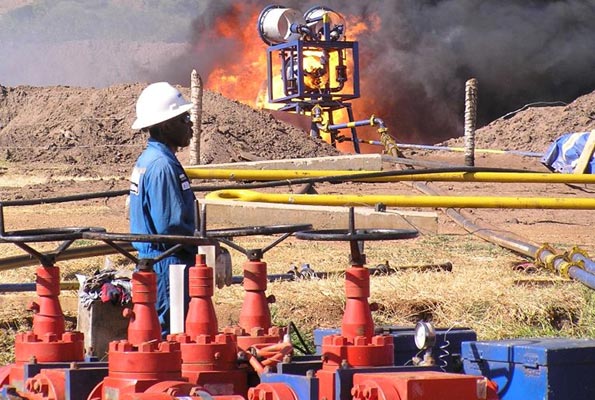By URN
The Petroleum Authority of Uganda (PAU) is not happy with the pace at which Ugandans have taken up employment and investment opportunities in the oil and gas sector.
This is despite the government putting in place a local content policy to empower local investors and job talent, including ring-fencing some contacts as well as creating a talent database for those seeking to be employed.
Speaking at an event focused on empowering small and medium enterprises (SMEs) through risk management strategies, Penina Aheebwa, the Director for Economic and National Content Monitoring at PAU said despite the Local Content Policy in place, Ugandan companies in the sector were still few, and mainly in low-level works.
Even those that are there are involved basically in “low-level contract”, save for a few in environment management, civil works and logistics, according to Aheebwa.
The event organized by Stanbic Business Incubator under the theme “Risk Management and Resilience: Leaving No One Behind,” was aimed at building adaptive strategies for inclusive business growth, providing a platform for knowledge-sharing, mentorship and networking, especially for SMEs.
To date, reports show that more than 5 billion dollars (18 trillion shillings) has been spent on various contact works in the oil and gas sector, with Ugandan companies taking just over 40 percent of this.
The National Content Policy gives advantage to Ugandan companies to take up Tier 2 (contracts offered by the major contractors) and Tier 3 contracts.
Aheebwa said that the easiest way for local companies to get the contracts in by going into joint ventures with larger or even foreign companies because they have the technical ability.
Unfortunately, according to her, even in the joint ventures, the local companies play very minimal roles, leaving the benefits to go to their foreign partners.
One other disappointing fact, she said, was that many local companies went into the contracts without studying the terms and conditions thoroughly and ended up being frustrated, and many have since abandoned them.
“We urge SMEs to invest in risk management tools, from digital solutions to robust financial practices, to anticipate and mitigate potential threats.
This is key to ensuring resilience in an increasingly volatile business environment, especially in sectors like oil and gas where the stakes are high,” she said.
Cumulatively, at least 147,609 jobs have been created in the various oil and gas and related sectors.
Stanbic Business Incubator, a support organisation for SMEs in selected sectors like oil and gas, has been training and financing young entrepreneurs to enable them take advantage of the new opportunities.
Catherine Poran, Chief Executive of Stanbic Business Incubator Limited, said they would continue to providing tailored capacity-building programs that enhance access to finance, markets and operational skills.
She, however, urged entrepreneurs to mitigate the human risk by finding the right talent to support them to allow for continuity and sustainability.
“It is common practice for our Ugandan founders to hold all their business information to their chest even if they are breaking, learn to take advantage of the available talent to support you so you don’t drop dead because of your business,” she added.
Addressing the participants on the importance of risk management for business sustainability, Rutabanzibwa Lwanga, The Head of Non- financial Risk at Stanbic Bank Uganda, said, it was good to be optimistic, but while appreciating and managing business risks as a way of managing the business responsibly.
Harold Ssemalawadde, the proprietor of logistics company, Globe Trotters, who has worked with the oil and gas companies for more than a decade, said the main risks to businesses are the urge to divert credit money and borrowing from money lenders, other than banks.
Globe Trotters is a Tier 2 company and has contracts from Tier One companies like McDermott. These, he said, can never lead to a successful business and that sooner or later, it will collapse.
One of the challenges that Ugandan companies have reported severally is the delays in getting paid by their contractors, which makes it hard for them to honour their service providers or the lower tier contractors.
Timothy Murungi, the Uganda Country Manager of McDermott, a Tier 1 contractor in the Tilenga project, demystified and clarified the procurement and contracting process for local content companies.
He said they have a system where they support their contractors to maintain cash flows so that they remain in operation.
However, he said, that some of their subcontractors were delaying to pay their lower contractors or suppliers even after the Tier 1 company had cleared them.
Now, he said they tier 2 contractor must prove that they have paid their tier 3 and tier 4 subcontractors, before new money is released to them, all aimed at ensuring that the whole supply chain is well maintained.
//Cue in: “So we try…
Cue out:…in the market.”//
Meanwhile, PAU says the oil and gas commercialization phase is progressing well towards production, with Tilenga’s preparation now at 45 percent, while Kingfisher is 55 percent ready, as per the end of September.



